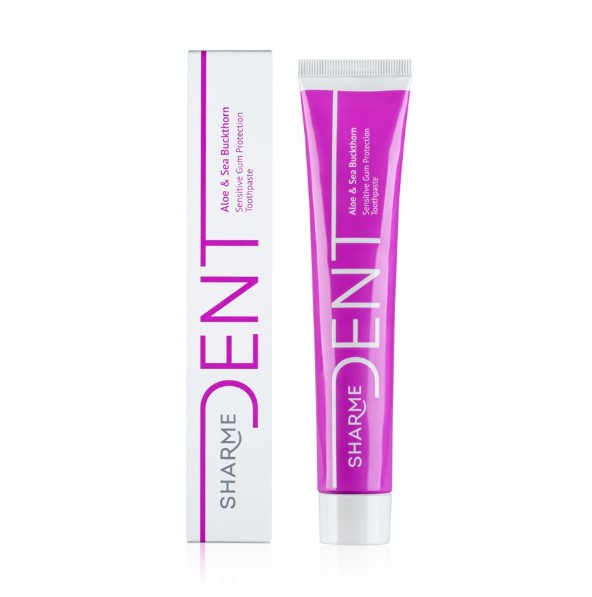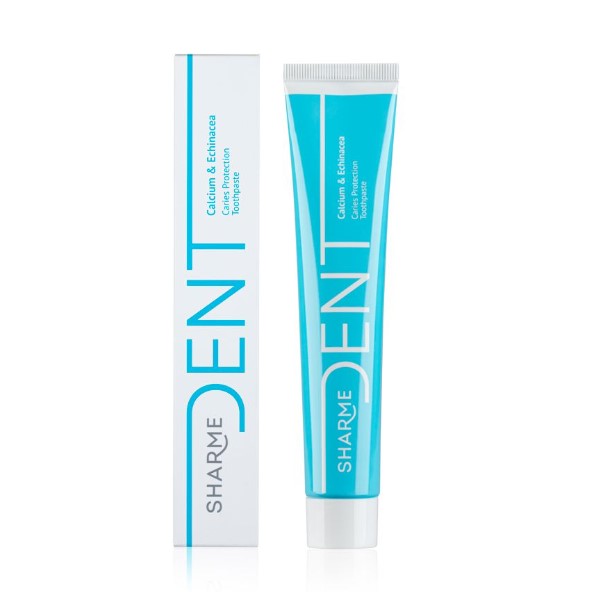
Aloe & Sea-buckthorn
SHARME DENT Toothpaste Aloe & Sea-buckthorn for delicate gum protection, 75 ml

Сalcium & Echinacea
SHARME DENT Toothpaste Сalcium & Echinacea for protection against caries, 75 ml

ALL SHARME DENT
Click to view the full assortment with novelties

GET 20% DISCONT
Want to save money on shopping?
Are you planning a big order?
Would you like to register your friends?
Then you definitely need an Partner registration!
Registration is free
WhatsApp Viber Telegram
Eco Toothpaste SHARME DENT Greenway Global Europe Products Catalog Price
Regular maintenance of oral hygiene will save you from many problems, such as: tooth decay, tartar buildup, bad breath.
At night, food remains decompose in the mouth, which causes a bad smell, so brushing your teeth in the evening is necessary.
Let's start with problems, oral diseases include:
- aphthas,
- gingivitis,
- mycosis,
- caries,
- bad breath, etc.
These are just some of the problems that result from poor oral hygiene. They lead to more complex diseases that require long-term treatment.
Often what begins to happen in the mouth is not laziness, but ignorance. That's why it's worth knowing more about how to take care of your mouth so you don't get an infection.
1. Bad breath
Bad breath is a common problem for many people. The inside of the mouth, as a warm and humid place, is a favorable environment for the development of bacterial colonies, which are more often located on the back of the tongue. Thus, poor oral hygiene, irregular brushing and flossing contribute to bad breath. As a result, infections or caries may occur. The mechanism is simple and clear. As a result of improper hygiene of the teeth, gums and tongue, food particles remain in the spaces between the teeth. There they roam, which leads to decay.
2. Gingivitis and periodontitis
When the teeth are heavily infected, this leads to gingivitis and periodontitis, which not only increases bad breath, but also causes severe pain. Advanced cases lead to inflammatory hyperplasia, which must be removed surgically.
Poor hygiene leads not only to problems in the oral cavity itself, but can also contribute to the emergence or exacerbation of various diseases:
- cardiovascular,
- kidney problems
- autoimmune diseases,
- allergies and many others.
Oral infections often lead to periodontitis, gingivitis, inflammation of the tongue and mucous membranes, and caries. In special cases, they can lead to precancerous or neoplastic conditions in oral tissues. These diseases not only look unpleasant, but are also painful, and their treatment is long and costly.
All diseases caused by poor hygiene are very dangerous. If not detected and treated in time, it leads to tooth loss. The most dangerous is periodontitis. It leads to the death of tissues responsible for holding the tooth in the mouth.
Treatment of advanced forms of periodontitis is complex and expensive. Proper hygiene and prevention, visiting the dentist and hygienist, cleaning stones are very important. All this will save you from unpleasant complications.
3. Oral care
There are oral diseases that do not result from poor hygiene, but in many cases it is this hygiene that reduces the risk of specific infections. Most experts list four basic steps to a beautiful and healthy smile:
- brush your teeth with fluoride toothpaste at least twice a day, especially after breakfast and before bed,
- brush your teeth with dental floss every day,
- limit the number of meals each day,
- Regular visits to the dentist.
4. Brushing your teeth
The toothbrush should be neither too soft nor too hard so as not to injure the gums. Brush your teeth from top to bottom for the upper jaw and from bottom to top for the bottom. Many will find this painful at first, as the gums will bleed. However, with prolonged brushing of the teeth by this method, excellent results can be achieved.
Brushing is uneven. The angle of the brush in relation to the tooth is approximately 45 degrees. It is necessary to clean each tooth separately, both in front and behind, moving forward and backward. After brushing your teeth, you should also clean your tongue by moving the brush back and forth over your tongue.
Brush your teeth properly for at least 2 minutes twice a day. It is also worth remembering that it is very important to clean the interdental spaces with a floss. The toothbrush does not clean the surfaces between the teeth. Rinsing your mouth helps clear hard-to-reach areas and improves breathing. There are special irrigators, interdental brushes, tongue brushes and many other useful accessories on the market that can improve your daily oral hygiene.
Especially carefully it is recommended to clean the chewing surface of the molars. Most people are used to using toothpaste. Most of them contain medicinal additives. Therefore, when choosing a toothpaste in the store, be sure to pay attention to its content and choose the one that suits you best. If you have enamel abrasion , you should brush your teeth only with a soft brush and only with toothpaste, and not with toothpowder, which some people prefer to use. Changing this habit is not necessary if the teeth are healthy and the person is used to using them. It is recommended to buy a brush with sparse bristle bushes, then its hairs will be easier to penetrate into the interdental spaces.
The toothbrush will better clean the surface of the teeth and the gaps between them if the bristle bushes are cut horizontally, without protrusions and notches. Store your toothbrush in a glass, bristles up, after lathering it up.
Rinse off soap suds before brushing your teeth. Do not brush your teeth with soap, as it contains alkali, which irritates the gums. It is better to use a brush, wetting it with water. To strengthen the gums, eat fruits and raw vegetables that have a dense texture, such as apples, radishes, cabbage, etc. Remember that the absence of teeth is a serious cosmetic and hygienic disadvantage. This makes it difficult to chew food, which worsens digestion. Therefore, in this case, you should contact your dentist and replace the missing tooth with a new one.
5. Flossing
A piece of dental floss 40-45 cm long must be wound around the fingers. Then press the floss firmly against each tooth, gently moving it from the gum up and down the side of the tooth. Repeat these steps for each tooth, using the clean part of the floss wrapped around your fingers.
6. Diet and oral hygiene
Not only the correct brushing of teeth and tongue affects the condition of the oral cavity. Proper nutrition also plays a significant role here. As in the case of an ideal figure, frequent snacking is the worst enemy on the way to beautiful and healthy teeth. Frequent contact of teeth with food, especially with sugar, is critical for them - this is an ideal breeding ground for bacteria. That's why it's so important to rinse your teeth with water after every snack. If a snack is required, it is best to choose nutritious foods and eat them in moderation.
Everyone has plaque-forming bacteria in their mouths. When they encounter food and starch, they react with acids. This lasts up to 20 minutes after a meal. During this time, tooth enamel weakens and, as a result, caries occurs. Therefore, when you need to eat something, it is better to eat a healthy product, then rinse your teeth and use chewing gum.
By observing oral hygiene, many unpleasant and costly diseases can be avoided. A beautiful smile and fresh breath are an integral part of a flawless image.
